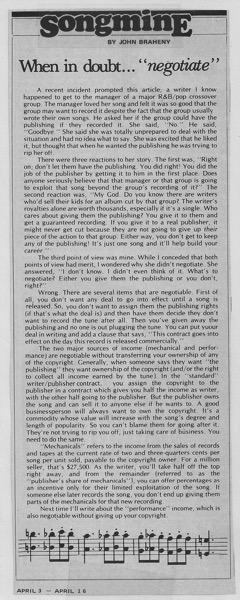A John Braheny Songmine column from the archives…

Accession Number: C000000137-029-002 Document/Digital File, “Songmine: When in Doubt…”negotiate”by John Braheny”, OCR converted text under same Accession Number
(Digitally converted text. Some errors may occur)
Songmine
BY JOHN BRAHENY
When in doubt… “negotiate”
A recent incident prompted this article; a writer I know happened to get to the manager of a major R&B/pop crossover group. The manager loved her song and felt it was so good that the group may want to record it despite the fact that the group usually wrote their own songs. He asked her if the group could have the publishing if they recorded it. She said, “No.” He said, “Goodbye.” She said she was totally unprepared to deal with the situation and had no idea what to say. She was excited that he liked it, but thought that when he wanted the publishing he was trying to rip her off.
There were three reactions to her story. The first was, “Right on; don’t let them have the publishing. You did right! You did the job of the publisher by getting it to him in the first place. Does anyone seriously believe that that manager or that group is going to exploit that song beyond the group’s recording of it?” The second reaction was, “My God. Do you know there are writers who’d sell their kids for an album cut by that group? The writer’s royalties alone are worth thousands, especially if it’s a single. Who cares about giving them the publishing? You give it to them and get a guaranteed recording. If you give it to a real publisher, it might never get cut because they are not going to give up their piece of the action to that group. Either way, you don’t get to keep any of the publishing! It’s just one song and it’ll help build your career.”
The third point of view was mine. While I conceded that both points of view had merit, I wondered why she didn’t negotiate. She answered, “I don’t know. I didn’t even think of it. What’s to negotiate? Either you give them the publishing or you don’t, right?”
Wrong. There are several items that are negotiable. First of all, you don’t want any deal to go into effect until a song is released. So, you don’t want to assign them the publishing rights (if that’s what the deal is) and then have them decide they don’t want to record the tune after all. Then you’ve given away the publishing and no one is out plugging the tune. You can put yuour deal in writing and add a clause that says, “This contract goes into effect on the day this record is released commercially.”
The two major sources of income (mechanical and perfor-mance) are negotiable without transferring your ownership of any of the copyright. Generally, when someone says they want “the publishing” they want ownership of the copyright (and/or the right to collect all income earned by the tune). In the “standard” writer/publisher contract, you assign the copyright to the publisher in a contract which gives you half the income as writer, with the other half going to the publisher. But the publisher owns the song and can sell it to anyone else if he wants to. A good businessperson will always want to own the copyright. It’s a commodity whose value will increase with the song’s degree and length of popularity. So you can’t blame them for going after it. They’re not trying to rip you off, just taking care of business. You need to do the same.
“Mechanicals” refers to the income from the sales of records and tapes at the current rate of two and three-quarters cents per song per unit sold, payable to the copyright owner. For a million seller, that’s $27,500. As the writer, you’ll take half off the top right away, and from the remainder (referred to as the “publisher’s share of mechanicals”), you can offer percentages as an incentive only for their limited exploitation of the song. If someone else later records the song, you don’t end up giving them parts of the mechanicals for that new recording.
Next time I’ll write about the “performance” income, which is also negotiable without giving up your copyright.
APRIL 3 — APRIL 16
See all previous entries in the Songmine Series
About Songmine and Music Connection Magazine:
John Braheny met Eric Bettelli and Michael Dolan right before they were going to publish Music Connection magazine. Eric and Michael wanted to get their publication out to as many songwriters as they could. They had already heard of the LA Songwriters Showcase, and of John and his partner, Len Chandler. John’s goal was to advertise the schedule of guest speakers and performers at the weekly Showcase… so they made a deal.
They published John’s Songmine column (he had never before written a magazine article!) in their very first edition, in November 1977. Trading out the column for advertising, this arrangement continued for many years. Plus, Eric and Michael came to the Showcase each week and distributed free copies to the songwriters!
Those articles became so popular that (book agent and editor) Ronny Schiff offered John’s articles to F&W Media, where they became the backbone of John’s textbook, The Craft and Business of Songwriting. As a follow-up, Dan Kimpel (author, songwriter, teacher), who had also worked at LASS, took on the Songwriting column at Music Connection magazine which continues to this day! You can subscribe to get either hard copies or online.
No comments yet.